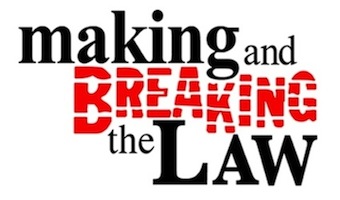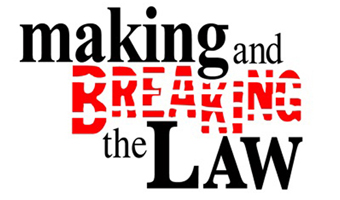The Center for Law, Justice & Culture welcomes students of all majors to sign up for the many exciting Making and Breaking the Law theme courses in Fall 2016.
Please contact theme leader Haley Duschinski f or more information about the theme and to receive a poster listing all Making and Breaking the Law courses offered in Fall 2016.
or more information about the theme and to receive a poster listing all Making and Breaking the Law courses offered in Fall 2016.
CAS 2500: Breaking the Law
Dr. Haley Duschinski, Dr. Bruce Hoffman, Dr. Marina Peterson
TTh 1:30-2:50 p.m.
This team-taught interdisciplinary course examines the complexities of law, justice, social change, human rights, globalization, and technology in the 21st century. It is open to freshmen and sophomores in any major, with no prerequisites. The 4-credit course satisfies Tier II Social Science or Humanities requirements.
AAS 2540: History of Injustice in the United States
Dr. Bayyinah Jeffries, Assistant Professor of African American Studies
TuTh5:15-6:35
This course is designed to give a socio-legal-historical perspective respecting the patterns of injustice in various areas of African American life. American Blacks are, of course, not the only victims of racism/injustice, but in the past they have been – by far – the largest and the most active of the country’s minorities and thus the appropriate focus for review of the law and injustice.
AAS 3691: U. S Constitutional Law: Pre-Civil Rights Movements
Dr, Patricia Gunn, Associate Professor of Law and African American Studies
TuTh 10:30-11:50 a.m.
While learning the basic principles of Constitutional Law and legal reasoning, students taking this course will also learn the critical role law plays in correcting social injustices in our society, the significance of precedents and stare decisis in a common law system; and how to distinguish cases that have similar factual bases but different judicial holdings. The course is also intended to help students develop a sharpened sense of civic responsibility, especially in relation to issues of equality and justice.
ENG 3290: Rhetoric and Law
Dr. Sherrie Gradin, Professor and Department Chair of English
MWF 3:05-4:25 p.m.
Rhetoric and law were interdependent in Ancient Greece. This course introduces students to rhetorical concepts and appeals that remain critical to the practice of American law as they arise out of western rhetorical history. Legal concepts from other cultures will provide further context. The course will also introduce rhetorical analytical methods for understanding the textual features of law and policy through concepts such as stasis theory, audience, appeals, and common ground. Assignments might include rhetorical analyses of legal documents, presentation of legal cases, analyzing an important legal decision, analyzing the impact of particular laws on issues of race, class, gender, orientation or disability. Students will study written rhetorical and textual features of legal genres.
PBIO 2050: Biotechnology: From the Lab to Life
Dr. Zhihua Hua, Assistant Professor of Environmental and Plant Biology
MWF 2:00-2:55 p.m.
What is biotechnology? This course includes information about research findings and their applications to the field, the marketplace and daily life. The course will cover the basic biological principles behind biotechnology from brewing to genetically modified organisms (GMO). Learn about what happens in the research lab and how that translates to daily life. This course will introduce students not only to the science but also to the public debate surrounding these issues.
ECON 3160: Economics and the Law
Dr. Harold Winter, Associate Professor of Economics
MWF 10:45-11:40 a.m.
Major topics are property, contracts, and torts. Class time is divided between economic analysis of these topics in the abstract and actual legal cases that involve these topics.
GEOG 3460: Environmental Law
Robert Shostak, Esq., Assistant Professor
TuTh 4:35-5:55 p.m.
Legal aspects of both individual environmental and societal environmental rights and duties with respect to constitution, private property, nuisance, negligence, statutes, regulatory agencies, and court decisions. Emphasis on case study of federal, state, and local laws that shaped existing law and those that are likely to shape future legislative and administrative action.
POLS 4550: International Law
Dr. Andrew Ross, Associate Professor of Political Science
TuTh 12:00-1:20 p.m.
Studies the contribution of international law to order, power, and justice in international politics. Explores historical origins and current problems in the field, with attention to classic debates over the sources, purposes, and interests associated with international law. Places formal aspects of law (centered on the United Nations and the International Court of Justice) within the wider context of global governance, including the influence of customary international law and the work of non-governmental organizations. Discussions and readings include critical perspectives on international law as a vehicle of power in a world of inequality.
POLS 4757: Race, Violence and Human Security
Dr. Vincent Jungkunz, Associate Professor of Political Science
Th 6:00-8:45 p.m.
There are few issues in contemporary politics more important than human security. There are also few forms of oppression and discrimination more important than racism. Yet, envisioning and seeing the various ways that racism leads to vast and deep human insecurity have generally been neglected as political problems and inquiries. Addresses racism and racial violence as human security issues, encouraging students to search out creative ways to reduce the varied hostile environments that emerge from racist forces.
POLS 4902: Special Topics in Law and Politics: Law and Colonialism
Dr. Jennifer Fredette, Assistant Professor of Political Science
TuTh 1:30-2:50
In-depth exploration of a special topic in the study of law and politics. Exposed to advanced research, key concepts, theoretical debates, and/or methodological concerns with respect to the study of the politics of law in domestic and global settings. .
SOC 3650: Sociology of Mental Illness
Dr. Ursula Castellano, Associate Professor of Sociology
MW 3:05-4:25
Study of social and cultural foundations of mental illness, including review of historic and contemporary definitions of madness and treatment of mental illness. Distribution of mental illness in population and social factors related thereto. Nature of commitment process and legal, moral, and social implications of commitment. Examination of legal processes pertaining to criminal insanity.
SOC 3660: Punishment and Society
Dr. Nicole Kaufman, Associate Professor of Sociology
MWF 2:00-2:55 p.m.
Examines the history, operation, and problems of punishment. Patterns of prison organization, inmate group structure, personnel organization, and racism examined. Purpose and effectiveness of penal institutions described. Prisons, juvenile institutions, parole, halfway houses, and alternatives to punishment studied.
SOC 4640: Law in Societies
Dr. Bruce Hoffman, Associate Professor of Sociology
TuTh 12:00-1:20 p.m.
Explores the fundamental roles that law plays in organizing contemporary social life. Considers various ways of understanding law’s complex presence: how law shapes and enables routine social interaction, how law constructs differences among people and their actions, how law mediates and enforces power relationships, and how law matters for the kind of societies we have. Our inquiries will examine official legal institutions and actors, but the class will emphasize how law works as a complex array of norms, symbols, discourses, and practices that infuse and shape all aspects of social life, from everyday social interaction to social movements and official legal institutions and actors. The course draws from the U.S. experience as well as historical, international, and transnational perspectives.



















Comments